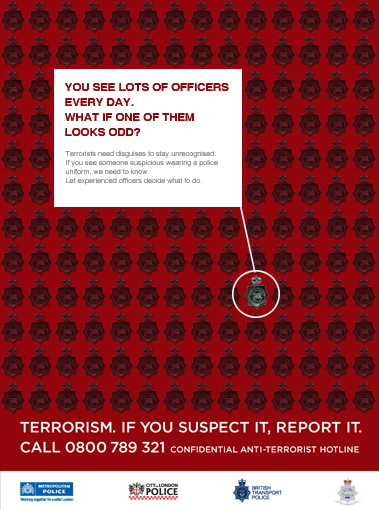We are developing the social individualist meta-context for the future. From the very serious to the extremely frivolous... lets see what is on the mind of the Samizdata people.
Samizdata, derived from Samizdat /n. - a system of clandestine publication of banned literature in the USSR [Russ.,= self-publishing house]
|
The following sign is presently visible on the sides of London bus shelters.
So, the economically productive parts of the London economy are being asked to subsidise bus travel for the less economically productive parts, are they? Par for the course, I guess.
Hang, on, what is this at the bottom?
Huh?
Ah…. okay. It seems that due to the deep and touching international friendship in the name of Socialism between Hugo Chavez and Ken Livingstone, Venezuela is providing oil at below market prices so that the welfare recipients of London can have half price bus travel. I do not know how your average man on the street in Caracas feels about this, but personally I am wondering just how fast it is possible to see the back of either of these amoral and wretched men. At least we in London have a mayoral election in May so that we can hopefully get rid of Mr Livingstone. The people of Venezuela are probably less lucky.
Or perhaps we are not so lucky. I guess we will find out. Assuming we do, it may be that the only virtue of democracy is that it gives us the opportunity to throw politicians out when a few years in power has made them too odious for anyone to stand any more. In this case I suspect I shall be sufficiently moved to actually cast a vote.
Al Gore, call your office:
Forecasters are predicting a cold and windy Easter weekend, with snow, gales and heavy downpours in some regions. With snow expected to blanket the north, temperatures will drop as low as -8C in some areas, with particularly treacherous conditions possible over the Scottish mountains.
From the Independent newspaper, ironically one of the most vociferous advocates of the idea that the Earth is doomed from global warming, killer bees or whatever.
Of course, as Dale Amon said the other day, it makes sense to think how free marketeers should address the question of “what if man-made global warming really is a problem?” rather than just poke fun at it, as I am doing here. Dale is right, of course, just in the same way that advocates of civil liberties need to recognise that we face a terrorist threat and not, as one or two libertarians of my acquaintance can do, deny it. Changing ocean currents, caused by movements in the Arctic ice shelf, might, for example, explain why the Gulf Stream is not working its balmy magic on the British climate this time of year. But you can see how perplexing all this must be to people constantly harangued about the need to drastically cut down on carbon usage. The earth does not seem to be getting hotter, at least not around here. It is bloody cold, in fact. But then, my parents and grandparents will point out to me that Easters have often been terrible in the past; they can even remember it snowing in late April.
All the London newspapers today are full of a new but familiar “report on strange people to the wonderful and efficient experts in the police” anti-terrorism advertisement.
I am a foreigner. I have five mobile phones. Readers are invited to speculate as to why this is (although it could just be that “I need communication”, or perhaps that I find that sitting in a bar sending text messages to myself relieves the monotony of life). I swap their SIMs around all the time, often in public places and for sinister reasons like “The battery ran out on my main phone and I still want to receive calls on that number”..
Also, I like to wander around London and other cities photographing things like bridges, container ports and other critical infrastructure.
When am I going to be reported? Will I be sent to Guantanamo? Will Brian be there too? Why the fuck are these people wasting my taxes like this?
Also, where did the “thousands” come from? If we are talking the whole world, it would be “billions”. If we are talking the UK it would be “tens of millions”. Statistics actually suggest that there are around seventy million active mobile phones in the UK. Given that that is ten million more than there are people in the national population, and given that there must be at least ten million people who realistically are too young to have one, there are at least twenty million suspicious phones in the UK.
Who knew the terrorism problem was this big?
Down in the dreary bowels of the Financial Times’ website, which has a list of what we happy people can expect in today’s budget, is this classic of FT understatement:
The chancellor will announce a delay in introducing international financial reporting standards to government.
No shit, Sherlock. In plain English, the vast debt bill incurred in the government’s Private Finance Iniative will not be put on to the public balance sheet for a while yet. How jolly conveeenient. If the PFI debt was so accounted for, it would add tens of billions of pounds of debt to the public balance sheet, making the state of the UK public accounts look positively Italian.
As I have said before, this “off-balance-sheet” stuff is a curse of modern finance, and should be scrapped.
Down in the West Country, fires are being lit:
Imagine, if you can, a party rally, put on by one of its regional branches, and attended by several hundred decent, ordinary people. Imagine, then, being able to watch a dozen or so people called to the podium to speak fluently and with passion about what they truly think. Imagine also being able to mingle throughout with the leaders and elected representatives of that party. Imagine all this, and you have UKIP.
The excellent speeches from that rally can be viewed here.
I spoke to Sean Gabb the following day. He told me that he perceived a ‘great suppressed anger’ among the people he met.
Good.
[A blogapotamus]
Mr Speaker,
Income tax is an evil. It is an evil not because it is a tax, but because of the way it works.
First, it takes from the citizen the choice of how to spend his money. Indirect taxation, though often in the past tweaked to show the state’s displeasure at certain choices, still leaves you a choice; to spend or save, and whether to have booze, burgers or broccoli for lunch.
Second, it requires the tax authorities to enquire how you obtain your money and how you spend it. The existence of exemptions and allowances, of deductible business expenses, returns and taxes management is essential to the operation of a system that would widely be seen as unfair if it fell as heavily on the pauper, the producer, and the rentier drone. But the existence of allowances and schedules, and latterly tax-credits, means people rightly use their rights, and the Revenue is incentivised to regard everyone as a cheat, to treat careful self-management as a form of fraud, and press for more powers and more bureaucracy. The system becomes ever more complicated, by special pleading and anti-avoidance; the complication allows for ever closer investigation of personal affairs, ever more complicated and impenetrable forms, and ever harsher treatment of the negligent, confused or exhausted taxpayer.
The result tends to a system of brigandage, where the law of collection is as uncertain as the Tax Inspector’s patience, where the small taxpayer is as much prey as he has fat on him, and only someone rich enough to fight a case as far as the House of Lords will ever find out what the law is. Having made the travellers empty their pockets, the suspicious highwayman will resort to strip searches, then to probing body orifices. Anyone who has made tax or tax-credit returns for a few years has had a similar experience.
Third through PAYE and deduction at source, it takes and spends your money before you get it. You may never notice it has gone. And if you do, and your financial knowledge is small, you may not realise how much of it has gone, nor make the connection between your vanishing money and state spending. That makes it easy for tens of millions of people to believe that it is always someone else who is paying for political promises.
Yes, income taxation is great evil. It tends to destroy liberty, privacy, and personal responsibility.
It may come as a surprise to the House and the country, therefore, that I, as the first Samizdatista Chancellor, am proposing to increase the rate of personal income tax. → Continue reading: Playing the budget game
The editor of The Spectator, Matthew d’Ancona, is not what you would call a combative journalist. I tend to feel that the Spectator, while still a highly readable publication these days, has tended sometimes to tag along a bit too tamely behind the Cameron/Brown consensus, although the magazine retains its robust elements, not to mention that entertaining if rather self-parodying old card, Taki.
What the Spectator thinks of Gordon Brown may not count for much outside the Westminster village of media/political junkies, but I reckon this ferocious column by d’Ancona about the government’s repulsive behaviour over the recent EU Constitution, sorry, Treaty, represents quite a shift. Whatever respect that d’Ancona used to voice about Brown has disappeared. I have never read anything so sharp by d’Ancona before. The trouble is, that it has taken far too long for the truth to dawn on even supposedly cynical media commentators that Brown is not a man of honour or principle. The mistake is to think that because he is Scottish, dour, unable to do the Blairite Dianaesque rhetoric, that he is therefore somehow more ‘solid’ or ‘honest’ than the actor-manager that he replaced. The truth, alas, is quite different. Brown is just another machine politician.
Even the most hard-bitten student activist would recognise its not an abrogation of his radicalism to get an ID card if it helps him to provide an assurance of his identity to those who provide services to him.
– Ms Home Secretary Jacqui Smith (quoted in Computer Weekly) reacting to criticism by the National Union of Students of plans to hustle and hassle students to register themselves for life on the great and glorious National Identity Register. It is just extraordinary how tone deaf to human life, how uncomprehending of the impulses to privacy and personal liberty, this strange class of apparatchiks is. Jacqui Smith’s own concept of radical activism may not extend very far. A friend who was her contemporary at Hertford College commented:
Yes, I remember Jacqui Smith from college but only vaguely. She was a fairly inoffensive JCR/political hack… you know… terribly earnest. I think she may have been president of the JCR at some point.
It seems she has grown, changed, and reinvented herself – as a monstrously offensive political hack.
Last week the Metropolitan police spent shed loads of taxpayers money on pointless advertising launched a new counter-terrorism campaign.
Londoners are being urged to help stop terrorists in their tracks by reporting suspicious behaviour, in a new counter terrorism advertising campaign.
The Metropolitan Police Service is asking people to trust their instincts and pass on information about any unusual activity or behaviour to the confidential Anti-Terrorist Hotline on 0800 789 321.
And now for the visuals:

When I saw those for the first time, I honestly thought these were a joke. And lo and behold, it did not take long for them to become just that…

And of course the Lolcats version:

Long live the internetz.
That the EU Referendum blog is unhappy at the latest turn of events in the UK parliament is an understatement:
In other words, in a very real sense – not at all an arcane, academic point – as Lisbon bites, it will no longer makes any difference at all who we elect. For sure, any new government will have some residual powers which it can call its own, but these will gradually be stripped from it as the EU starts to exert its newly-acquired powers.
It occurs, therefore, that the one thing we need to do is boycott the electoral process. If there is no point in having MPs, we should no longer partake in the charade that we have meaningful elections. There can be no better message to send to MPs than an ever-declining turnout. This robs them of even the pretence of legitimacy.
Quite so. It seems to me that we have the bizarre spectacle of MPs choosing to make themselves irrelevant. Perhaps they have reached the deep realisation that they are unworthy of being legislators, that their real role in life is to fiddle expenses, disport themselves on TV and go to foreign junkets. There is, quite frankly, no further use for them.
In moments like this, when so many powers are being transferred to a supranational entity like the EU with remarkably little democratic accountability, and on a scale that has no clear modern parallel, it makes me wonder what, if any point, there is in things like intellectual activism. Getting the message across in a national context is hard enough; trying to persuade Frenchmen, Germans, Italians, Dutchmen, Spaniards, Greeks, Portugese, Belgians and Finns of the case for less government is next to impossible. One of the reasons why I, as a libertarian, am broadly in favour of self-governing nation states is not out of some starry-eyed belief that they are always better than some broader alternative, but because experience teaches us that it is increasingly hard to make changes on a large, supranational level where there is not a shared culture or shared language.
The EU has had its merits, but I think the sad truth is, and has been for some time, that lovers of liberty cannot expect it to be reformed from within or turned into some sort of benign free trade zone. We have to get out.
There is currently a good deal of fuss about MP’s perks in Britain. People think they are not getting value for money. But conventional wisdom, as usual, is wrong. What we need to do is to reward MPs more the less they do.
It is the rest of the state, created by hyperactive legislation, that is truly out of control. The newly formed UK Libertarian Party suggests that income tax could be abolisheed in its entirety without touching what most people think of as “public services”, if only the country’s autonomous regulatory bodies and agencies – the quangos – were to be abolished.
Should anyone doubt this, a epitomic fabulous fact courtesy of the BBC’s File on Four programme. The part-time chairman of the South East England Development Agency – a body with no reason at all to exist – spent more public money on taxi fares in one year than all 659 MPs put together.
I quite enjoy going to the Proms, the renowned series of concerts held in the Royal Albert Hall, west London during the late summer. As many readers know, the last night of the Proms ends with a rousing performance of some of the best-loved works of Edward Elgar, such as “Land of Hope and Glory”. A government minister has claimed that the event does not fit in with the bright, shiny vision of Britain that the Gramiscians of New Labour believe is the one to which we should all aspire.
I could not agree more. It is time to face the fact that Britain, or indeed just England, is no longer a land of hope or much glory. Far better that the symbols of modern Britain be such things as state ID cards, unfunny standup commedians like Ricky Gervais and lumps of dead animals at The Tate.
Ok, rant over.
|
Who Are We? The Samizdata people are a bunch of sinister and heavily armed globalist illuminati who seek to infect the entire world with the values of personal liberty and several property. Amongst our many crimes is a sense of humour and the intermittent use of British spelling.
We are also a varied group made up of social individualists, classical liberals, whigs, libertarians, extropians, futurists, ‘Porcupines’, Karl Popper fetishists, recovering neo-conservatives, crazed Ayn Rand worshipers, over-caffeinated Virginia Postrel devotees, witty Frédéric Bastiat wannabes, cypherpunks, minarchists, kritarchists and wild-eyed anarcho-capitalists from Britain, North America, Australia and Europe.
|






